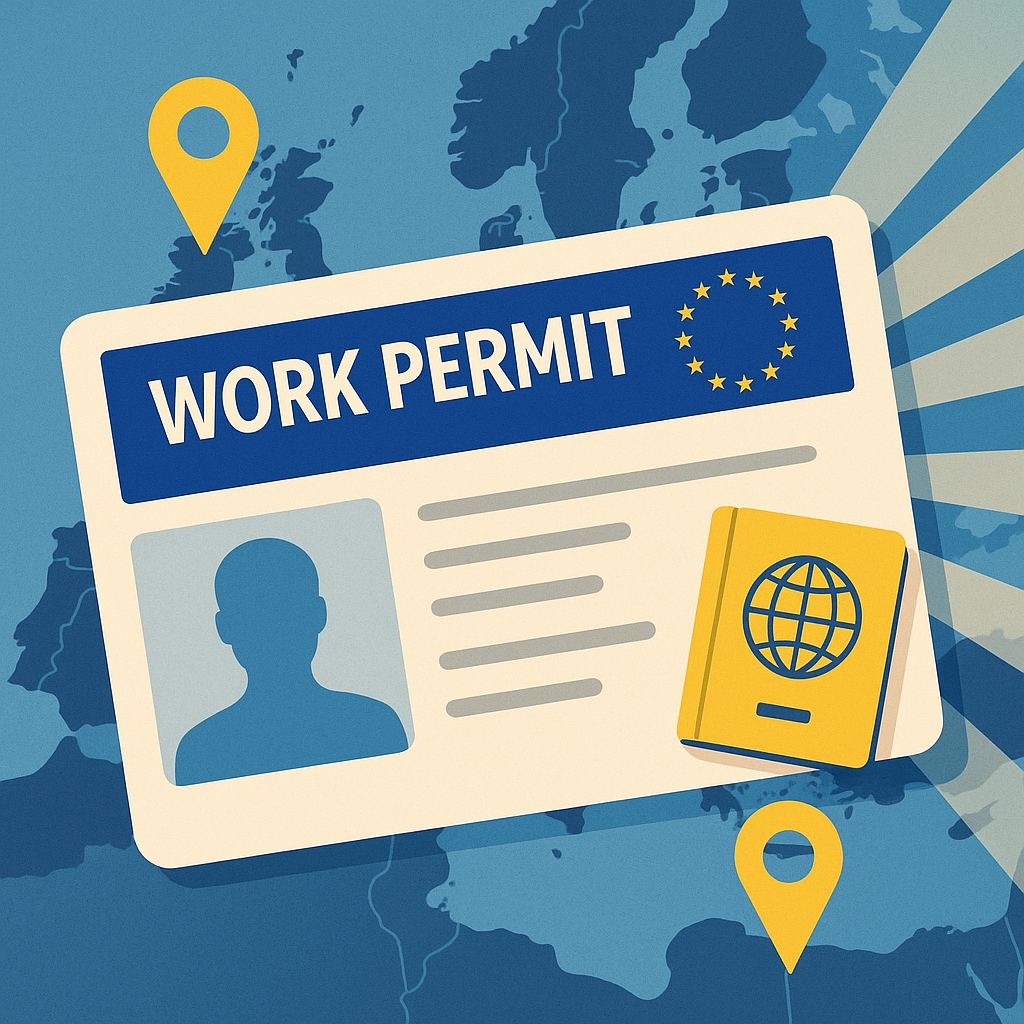Working in Europe is a dream for many professionals and skilled workers. With high salaries, great lifestyle, and diverse opportunities, European countries are opening doors for international talent. But before you start your journey, you’ll need a work permit.
In this blog, we’ll break down the step-by-step process to get a work permit in Europe, in a simple and practical way.
1. Understand what work permit is
A European work permit is a legal authorization for non-EU/Schengen Area citizens to live and work in a specific European country, required for maintaining legal status and preventing illegal immigration. Requirements vary by country but generally include a valid job offer, relevant qualifications, proof of financial stability, and a clean criminal record.
Permits exist for various purposes, such as short-term employment (less than 90 days), long-term employment, skilled worker roles, seasonal work, and intra-company transfers.
why is it require?
- Legal compliance: It ensures that you are legally allowed to work in that country, preventing issues with immigration authorities.
- Employer requirements: Your employer often needs to prove there’s a need for a foreign worker, which is why a valid job offer is typically a prerequisite for the permit.
- Skilled workforce development: Many European countries use work permits to attract and integrate skilled workers from abroad, filling labor shortages in high-demand sectors.
- Pathway to longer-term stays: After fulfilling the terms of a work permit, you may be eligible to apply for permanent residency and family reunification.
2.Choose the Right Country
Different European countries have different job markets, salaries, and permit rules.To choose the right European country, first define your professional and personal priorities for a high-quality life and career growth. for example:
- Germany – high demand for engineers, IT, and healthcare workers.
- Poland – popular for factory, production, and hospitality jobs.
- Finland & Sweden – high salaries and good work-life balance.
Research the country where your skills are in demand.
3.Secure a Job Offer
Most European work permits are employer-sponsored. This means you need a job contract first.
How to get a job offer in Europe:
- research countries and industries, tailor your European-style resume and cover letter, Apply and network actively through official job portals (EURES, Linkedin, Glassdoor).
- Connect with licensed recruitment agencies.International Recruitment Agencies: Many recruitment agencies partner with European job portals and offer services to assist with finding overseas jobs and the necessary work visas, especially for non-EU residents.
- Highlight your experience and certifications. To open more opportunities.
4.Gather the Required Documents
Once you get the job offer, collect the necessary documents. Common requirements include:
- Valid passport (minimum 6 months validity).
- Job contract or offer letter.
- Educational qualifications and skill certificates.
- Proof of work experience.
- Health insurance coverage.
- Police clearance certificate.
Some countries may also ask for language proficiency (e.g., German, Spanish, Finnish).
5.Apply for the Work Permit
Your employer usually applies for your work permit with local authorities. In some cases, you’ll need to submit your application at the embassy or consulate in your home country.
What are the steps?
- Fill out the official application form.
- Submit documents and pay fees.
- Wait for processing (can take 4 weeks to 3 months).
6.Receive Your Work Visa
If your application is approved, you’ll get a work visa sticker on your passport. This allows you to enter the country and start your job.
7.Travel to Europe and Register
Upon arrival:
- Register at the local immigration office or town hall.
- Apply for a residence permit (if required).
- Get your local ID number for tax and social benefits.
Country specific work permit examples:
Germany Work Permit (Blue Card)
- Germany offers the EU Blue Card for skilled workers.
- Eligibility: University degree, job offer with €45,300/year (lower for shortage jobs like IT or healthcare).
- Processing Time: 1-3 months.
- Benefits: Pathway to permanent residency in 33 months, family reunification.
Poland Work Permit:
- Poland is one of the easiest countries for international workers.
- Eligibility: Job offer in Poland.
- Popular Jobs: Production, logistics, hospitality, drivers, agriculture.
- Processing Time: 6-12 weeks.
- Benefits: Low cost of living, easy entry for non-EU workers, legal stay up to 3 years.
Finland Work Permit:
- Finland focuses on skilled professionals but also accepts general workers.
- Eligibility: Job contract, sufficient income (€1,331/month minimum).
- Popular Jobs: IT, healthcare, construction, seasonal work.
- Processing Time: 1-3 months.
- Benefits: High salaries, permanent residency in 4 years, family benefits.
Quick Tips for Success
- Always use legal and registered agencies.
- Learn basic local language it improves job chances.
- O Have some savings before moving (3-4 months expenses).
- Check the official government websites for updated rules.
Still confuse about how to start and seek personal guidance? Well then you are just a call away to start turning your dream to reality. Call us now for counselling session on +91 9825106789.

